
Discussions of LGBT rights at the United Nations have included resolutions and joint statements in the United Nations General Assembly and the United Nations Human Rights Council (UNHRC), attention to the expert-led human rights mechanisms, as well as by the UN Agencies.
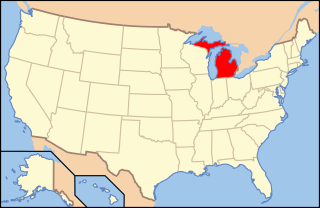
Lesbian, gay, bisexual, and transgender (LGBT) persons in the U.S. state of Michigan may face legal challenges not faced by non-LGBT residents. Same-sex sexual activity is legal in Michigan, as is same-sex marriage. Discrimination on the basis of sexual orientation and gender identity is not explicitly banned within state law. However, a ruling of the Sixth Circuit Court of Appeals and a decision of the Michigan Civil Rights Commission have ensured that members of the LGBT community are not discriminated against and are protected in the eyes of the law.
The Yogyakarta Principles is a document about human rights in the areas of sexual orientation and gender identity, published as the outcome of an international meeting of human rights groups in Yogyakarta, Indonesia, in November 2006. The Principles were supplemented in 2017, expanding to include new grounds of gender expression and sex characteristics, and a number of new principles.

Lesbian, gay, bisexual, and transgender (LGBT) people in the U.S. state of Florida may face legal challenges not experienced by non-LGBT residents. Same-sex sexual activity became legal in the state after the U.S. Supreme Court's decision in Lawrence v. Texas on June 26, 2003, and same-sex marriage has been legal in the state since January 6, 2015. Florida law does not address discrimination on the basis of sexual orientation in employment, housing and public accommodations. However, several cities and counties, comprising about 55% of Florida's population, have enacted anti-discrimination ordinances. These include Jacksonville, Miami, Tampa, Orlando, St. Petersburg, and Tallahassee, among others. Furthermore, discrimination on the basis of gender identity has been illegal in Florida since 2011 via Glenn v. Brumby, a court case decided by the Eleventh Circuit Court of Appeals. Conversion therapy is also banned in a number of cities in the state, mainly in the Miami metropolitan area.

LGBT residents in the U.S. state of Georgia face legal and social challenges not faced by non-LGBT individuals. Same-sex sexual activity has been legal since 1998, and same-sex marriage has been legal since 2015.

Lesbian, gay, bisexual, and transgender (LGBT) people in the U.S. state of Wisconsin have many of the same rights and responsibilities as heterosexuals; however, the transgender community may face some legal issues not experienced by non-trans residents, due in part to because discrimination based on gender identity is not included in Wisconsin's anti-discrimination laws, nor is it covered in the state's hate crime law. Same-sex marriage has been legal in Wisconsin since October 6, 2014, when the U.S. Supreme Court refused to consider an appeal in the case of Wolf v. Walker. Discrimination based on sexual orientation is banned statewide in Wisconsin, and sexual orientation is a protected class in the state's hate crime laws. It approved such protections on discrimination in 1982, making it the first state in the United States to do so. However, Wisconsin is one of the most pro-LGBT states in the Midwestern region of the U.S.

Lesbian, gay, bisexual, and transgender (LGBT) persons in the U.S. state of Pennsylvania face some legal challenges and discrimination not experienced by non-LGBT residents. Same-sex sexual activity is legal in Pennsylvania. Same-sex couples and families headed by same-sex couples are eligible for all of the protections available to opposite-sex married couples. Pennsylvania was the final Mid-Atlantic state without same-sex marriage, indeed lacking any form of same-sex recognition law until its statutory ban was overturned on May 20, 2014.
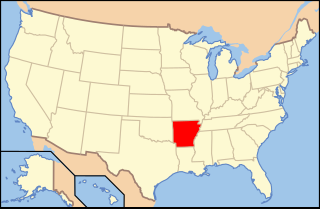
Lesbian, gay, bisexual, and transgender (LGBT) persons in the U.S. state of Arkansas may face some legal challenges not experienced by non-LGBT residents. Same-sex sexual activity is legal in Arkansas. Same-sex marriage in Arkansas became briefly legal through a court ruling on May 9, 2014, subject to court stays and appeals. In June 2015, the U.S. Supreme Court ruled in Obergefell v. Hodges that laws banning same-sex marriage are unconstitutional, legalizing same-sex marriage in the United States nationwide including in Arkansas. Discrimination on the basis of sexual orientation and gender identity is not banned statewide in Arkansas.
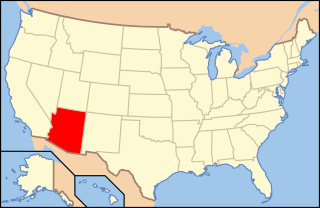
Lesbian, gay, bisexual, and transgender (LGBT) people in the U.S. state of Arizona may face legal challenges not experienced by non-LGBT residents. Same-sex sexual activity is legal in Arizona, and same-sex couples are able to marry and adopt.

Lesbian, gay, bisexual, and transgender (LGBT) persons in the U.S. state of Indiana face some legal challenges not experienced by non-LGBT residents. Same-sex marriage has been legal in Indiana since October 6, 2014, when the U.S. Supreme Court refused to consider an appeal in the case of Baskin v. Bogan.
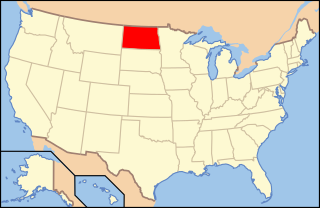
Lesbian, gay, bisexual, and transgender (LGBT) persons in the U.S. state of North Dakota may face some legal challenges not experienced by non-LGBT residents. Same-sex sexual activity is legal in North Dakota. Same-sex couples and families headed by same-sex couples are eligible for all of the protections available to opposite-sex married couples; same-sex marriage has been legal since June 2015. However, LGBT people still lack discrimination protections.

Lesbian, gay, bisexual, and transgender (LGBT) persons in the U.S. commonwealth of Kentucky have most of the same rights as non-LGBT persons have, but still face some legal challenges not experienced by other people. Same-sex sexual activity is legal in Kentucky. Same-sex couples and families headed by same-sex couples are not eligible for all of the protections available to opposite-sex married couples. On February 12, 2014, a federal judge ruled that the state must recognize same-sex marriages from other jurisdictions, but the ruling was put on hold pending review by the Sixth Circuit. Same sex-marriage is now legal in the state under the U.S. Supreme Court ruling in Obergefell v. Hodges. The decision, which struck down Kentucky's statutory and constitutional bans on same-sex marriages, and all other same sex marriage bans elsewhere in the country, was handed down on June 26, 2015.
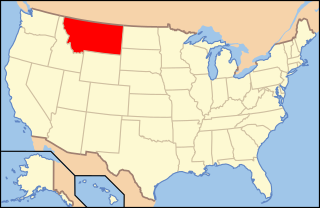
Lesbian, gay, bisexual, and transgender (LGBT) persons in the U.S. state of Montana may face some legal challenges not experienced by non-LGBT residents. Same-sex sexual activity is legal in Montana. Same-sex couples and families headed by same-sex couples are eligible for all of the protections available to opposite-sex married couples, as same-sex marriage has been legal since November 2014. However, discrimination on the basis of sexual orientation and gender identity is not banned statewide.
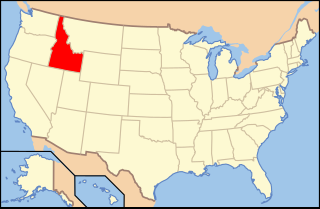
Lesbian, gay, bisexual and transgender (LGBT) people in the U.S state of Idaho may face some legal challenges not faced by non-LGBT people. Same-sex sexual activity is legal in Idaho, and same-sex marriage has been legal in the state since October 2014. Discrimination based on sexual orientation and gender identity is not banned in the state, leaving an estimated 31,800 LGBT workers in Idaho vulnerable to employment discrimination. Despite this, opinion polls have found a majority of Idahoans as supporting LGBT anti-discrimination laws, same-sex marriage and LGBT rights.

Lesbian, gay, bisexual, and transgender (LGBT) people in Kansas face some legal challenges not experienced by non-LGBT residents. Same-sex sexual activity is legal in Kansas. Although LGBT people are not covered under statewide anti-discrimination laws, certain cities and municipalities have enacted such protections and state level protections exist for state and public workers.

Lesbian, gay, bisexual, and transgender (LGBT) persons in the U.S. state of Alaska may face some legal challenges not experienced by non-LGBT Alaskans. Same-sex sexual activity has been legal since 1980, and same-sex couples have had the right to marry since October 2014. Nevertheless, the state offers few legal protections on the basis of sexual orientation and gender identity, leaving LGBT people vulnerable to employment, housing, and public accommodations discrimination. Discrimination against state employees on account of their sexual orientation is illegal, and three Alaskan cities, Anchorage, Juneau and Sitka, representing about 46% of the Alaskan population, have enacted anti-discrimination ordinances covering both categories.

Lesbian, gay, bisexual, and transgender (LGBT) persons in the U.S. state of Mississippi face legal challenges and discrimination not experienced by non-LGBT residents. Same-sex sexual activity is legal in Mississippi. Same-sex marriage is legal in accordance with the Supreme Court's decision in Obergefell v. Hodges. However, discrimination on the basis of sexual orientation and gender identity is not banned statewide. Jackson, Mississippi's state capital, enacted such protections in June 2016.
The regulation of LGBT employment discrimination in the United States varies by jurisdiction. Many states and localities prohibit bias in hiring, promotion, job assignment, termination, and compensation, as well as harassment on the basis of one's sexual orientation. Fewer extend those protections to cover sexual identity. Some cover government employees, but do not extend their protections to the private sector. Protections at the national level are limited. There is no federal statute explicitly addressing employment discrimination based on sexual orientation or gender identity. However, the Equal Employment Opportunity Commission (EEOC) interprets Title VII of the Civil Rights Act of 1964 to cover discrimination against LGBT employees, as "allegations of discrimination on the basis of sexual orientation necessarily state a claim of discrimination on the basis of sex". This interpretation in essence bars employment discrimination on the basis of sexual orientation in accordance with the Civil Rights Act of 1964. In 2012 the Equal Employment Opportunity Commission ruled that Title VII of the Civil Rights Act of 1964 does not allow gender identity-based employment discrimination because it is a form of sex discrimination. Then in 2015, the Equal Employment Opportunity Commission concluded that Title VII of the Civil Rights Act of 1964 does not allow sexual orientation discrimination in employment because it is a form of sex discrimination. However, these rulings, while persuasive, may not be binding in courts.

















